Facing the COVID-19 outbreak, European countries are stepping up efforts to contain the virus, save lives, and address the profound social and economic impacts of the pandemic.
BRUSSELS, April 5 (Xinhua) -- Although infections of COVID-19 are still surging in Europe, with a total of 583,141 confirmed cases and 42,334 deaths reported as of Saturday morning, the World Health Organization (WHO) has said the region could see a potential stabilization of the outbreak.
Suppressing virus transmissions, saving lives, addressing the profound social and economic consequences of COVID-19 ... Europe, the epicenter of the pandemic, has been escalating an arduous anti-virus battle since mid-March amid "a second window of opportunity."
"While the virus has hit us hard, the people of Europe have hit back just as hard," European Commission President Ursula von der Leyen said at an extraordinary session of the European Parliament.
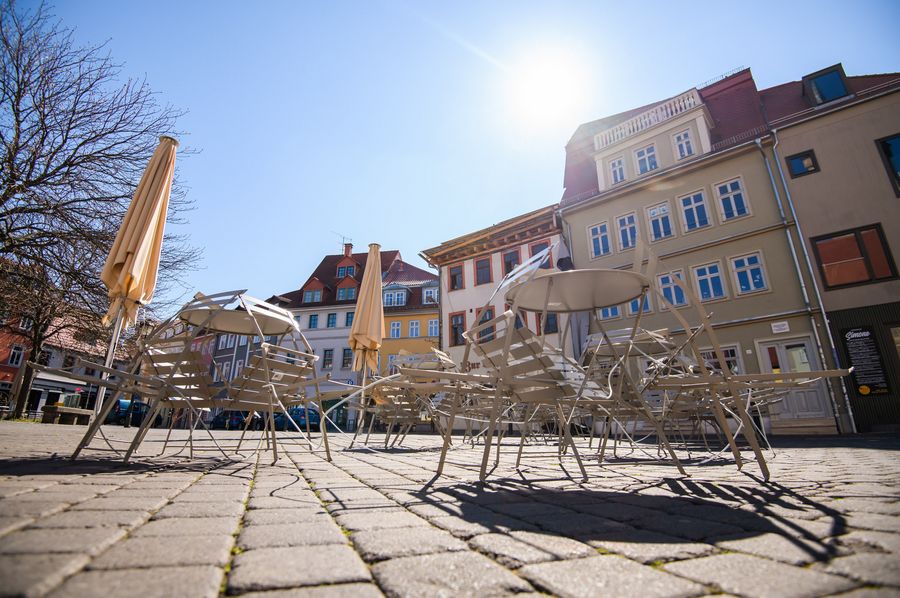
Piled tables and chairs are seen outside a closed restaurant in Erfurt, central Germany, on April 1, 2020. (Photo by Kevin Voigt/Xinhua)
UNPRECEDENTED LOCKDOWN
Gonzalo Resa Heras, a 21-year-old Spaniard, has been facing many changes in his life ever since Spain imposed a national lockdown on March 14 which, after an extension, will be in force until April 25.
For example, he does not need to wake up early every day to take a train from his hometown in the municipality of Torrejon de Ardoz to his university in the city of Alcala de Henares, as Madrid has suspended classes in schools indefinitely from March 11.
Apart from Spain, many other European countries have also extended their lockdown periods, tightened social restrictions and upgraded social distancing measures to slow down the spread of the virus.
Italy, which has reported over 120,000 confirmed cases with over 15,000 deaths, will extend its nationwide lockdown until April 13, Prime Minister Giuseppe Conte said, stressing the country is not in a condition to relax its restrictive measures yet.
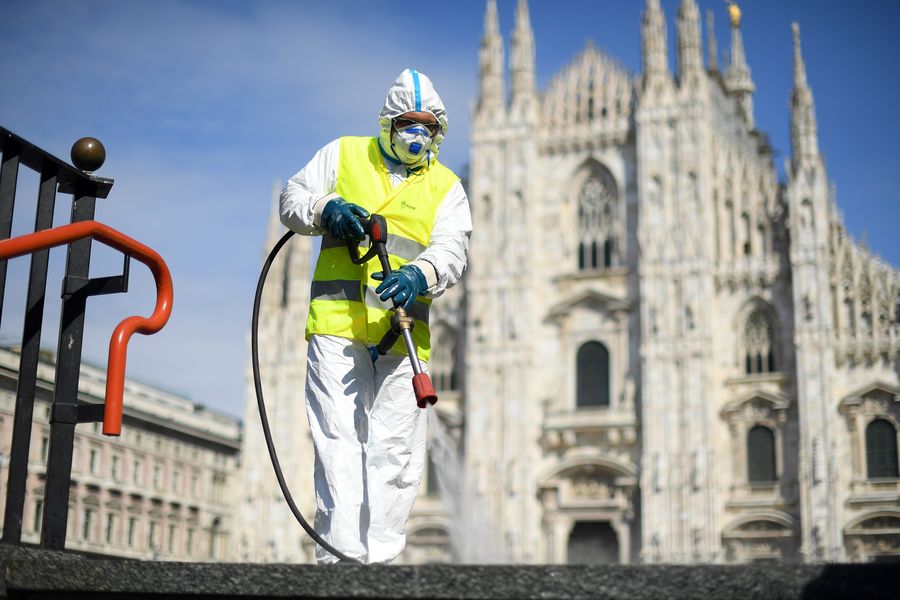
A sanitation worker wearing a protective suit and a face mask cleans the ground at Piazza del Duomo in Milan, Italy, on March 31, 2020.(Photo by Daniele Mascolo/Xinhua)
"We are beginning to see the positive effects" of the lockdown and relaxing it now would mean that the sacrifices made so far would have been in vain, said Conte.
Noting that the lockdown measures seem to be working, Dutch Prime Minister Mark Rutte said the country will extend the restrictions till April 28.
German Chancellor Angela Merkel asked citizens to refrain from private trips and visits from relatives during the Easter holidays, as the country has extended its restrictions on social gatherings to April 19 at the earliest.
The Greek Supreme Court has reminded the country's prosecutors of the need to strictly impose measures introduced by Greek health authorities, citing profiteering and illegal gatherings as examples of crimes on which prosecutors need to be especially tough.
Five municipalities in northern Greece facing a critical epidemic situation have imposed night curfews, and so has Cyprus for the first time during peacetime.
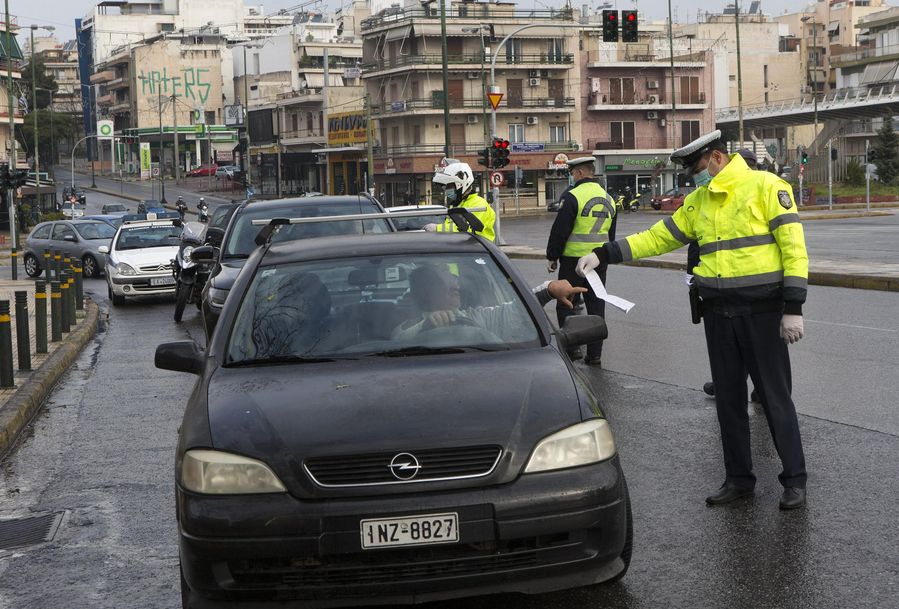
Policemen check drivers for special permissions that are needed to be outdoors in Athens, Greece, March 23, 2020. (Xinhua/Marios Lolos)
Calling the massive scale of unprecedented lockdown measures "a second window of opportunity," the chief of the World Health Organization (WHO) Tedros Adhanom Ghebreyesus has urged countries to use this critical window to suppress and stop the transmission of COVID-19.
Thanks to social distancing measures, European countries, particularly the most affected ones like Italy and Spain, could see the curve of cases potentially stabilizing, said Michael Ryan, executive director of WHO's Health Emergencies Program.
ENHANCED MEDICAL RESPONSE
Flattening the curve now requires redoubling public health efforts to find, test, isolate and treat every case, and trace every contact, said Ryan.
Taking the WHO's advice, Britain has pledged to expand its testing capacity from over 10,000 tests per day to 25,000.
The British government is taking "unprecedented actions" to increase the National Health Service capacity by ramping up the number of beds and staff, said the country's Foreign Secretary Dominic Raab.
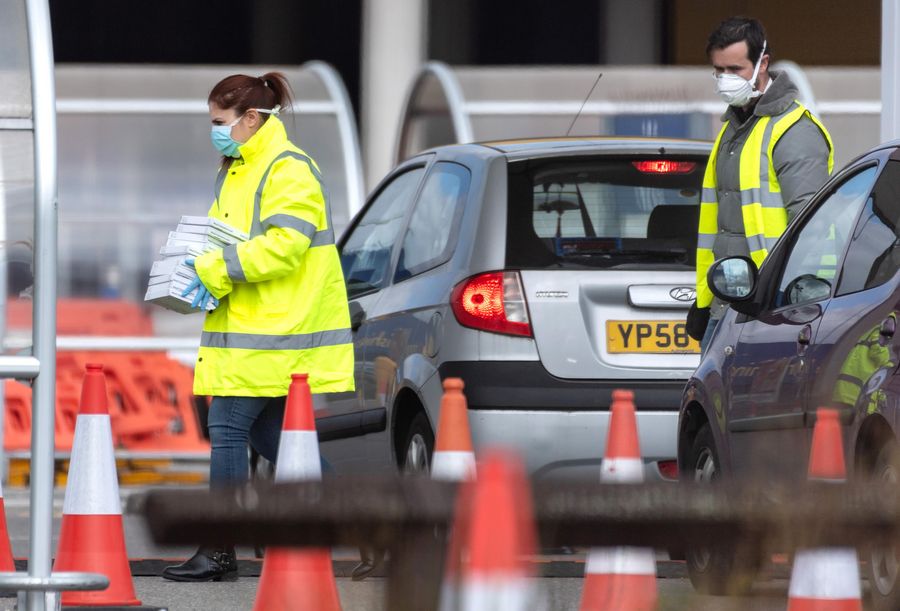
Staff carry equipment at a drive-through COVID-19 test station set up in the parking lot of an IKEA store in Wembley, northwest London, Britain, March 31, 2020. (Photo by Ray Tang/Xinhua)
French hospitals are now offering 10,000 beds for coronavirus patients, double the capacity in January. The government said it aims to provide 14,500 beds in April.
To address the shortage of frontline medical staff, Italian health care officials have called recently-retired doctors and nurses back to work, and pushed as many as 10,000 medical students into the field weeks before they were set to graduate.
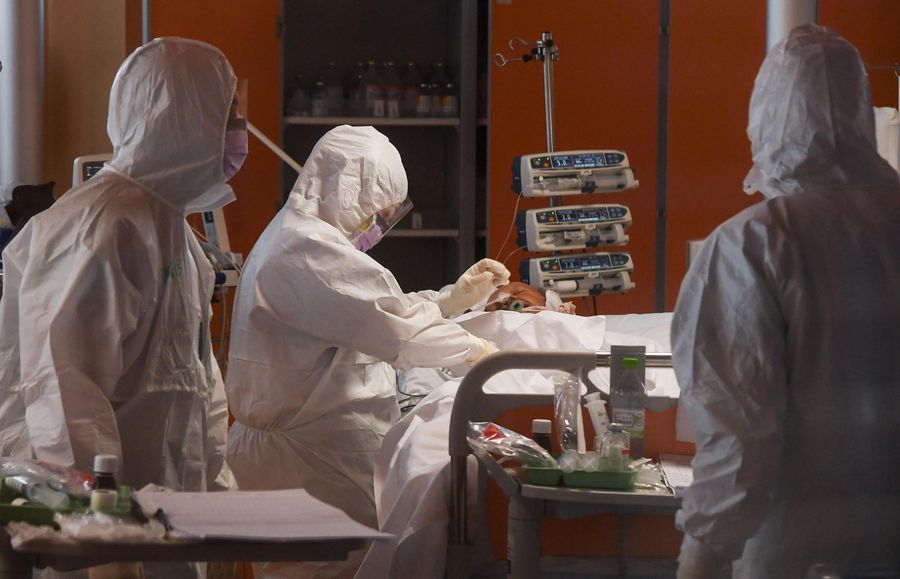
Medical personnel work in the ICU of Istituto Clinico Casalpalocco in Rome, Italy, March 25, 2020. (Photo by Alberto Lingria/Xinhua)
European countries have also been seeking support within and beyond the continent.
According to Serbian President Aleksandar Vucic, the country has received a significant number of respiratory ventilators from China as a donation.
With China's help, Serbia also managed to open a temporary hospital with around 3,000 beds, and decided to start massive testing among its population.

Serbian soldiers and staff members prepare beds for possible COVID-19 patients in the hall of the Belgrade Fair, in Belgrade, Serbia, March 24, 2020. (Serbian Defense Ministry/Handout via Xinhua)
By importing a great number of test kits from South Korea, Romania has increased testing capacity significantly to 2,000 tests on average per day.
Showing solidarity within the European Union (EU), France has donated one million masks to Italy, while Germany has delivered seven tons of medical equipment to the southern European country.
According to French Director General of Health Jerome Salomon, over 400 patients in serious condition have been transported from strained hospitals in and around Paris and in Grand Est near the German border to less-saturated hospitals in France and neighboring countries.
The European Commission has launched an accelerated joint procurement procedure and encouraged industries to raise production capacities, so as to facilitate the supply of protective and medical equipment across the continent.
Moreover, the EU has decided to support 18 research projects on COVID-19 with 48.5 million euros (52.4 million U.S. dollars).

Serbian President Aleksandar Vucic (L) greets members of the Chinese medical team via elbow contact in Belgrade, Serbia, March 21, 2020. (Xinhua/Shi Zhongyu)
EXTENSIVE ECONOMIC BAILOUT
"We're now in recession. It is way worse than the global financial crisis," International Monetary Fund Managing Director Kristalina Georgieva warned, stressing that saving lives and protecting livelihoods ought to go hand in hand.
Facing the economic consequences of COVID-19, the German government has approved the "largest aid package" in the country's history to combat the coronavirus, which Merkel called Germany's biggest challenge since World War II.
The government will seek to borrow around 156 billion euros (about 169 billion dollars) to finance a "protective shield" for families, employees, self-employed people and companies, and another 2 billion euros (2.16 billion dollars) to support start-ups.
"We will do everything in our power to prevent this crisis from questioning either the health care of our citizens or the economic processes of this country," said German Finance Minister Olaf Scholz.
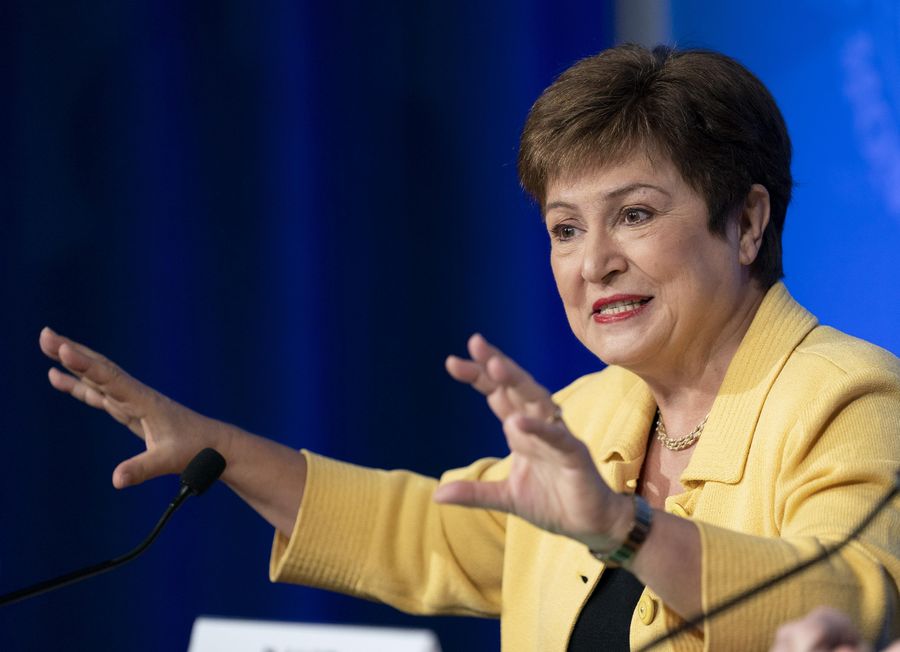
International Monetary Fund (IMF) Managing Director Kristalina Georgieva speaks at a press conference about providing necessary support to mitigate the economic and financial impact from the ongoing COVID-19 epidemic in Washington D.C., the United States, on March 4, 2020. (Xinhua/Liu Jie)
Greece recently presented an additional package of fiscal aid, including an expansion of emergency support of 800 euros (about 865 dollars) apiece in April to 1.7 million employees, or 81 percent of the total workforce, in the private sector.
Besides, the Greek government has covered all social insurance contributions for 45 days, along with a four-month suspension of all tax payments.

European Commission President Ursula von der Leyen (L) speaks at a press conference on EU's response to COVID-19 at the EU Emergency Response Coordination Centre in Brussels, Belgium, March 2, 2020. (Xinhua/Zheng Huansong)
Noting a possible recession in the euro area, European Central Bank (ECB) Vice-President Luis de Guindos said if the lockdown period in Europe lasts a long time, "each month will see a fall of approximately two percentage points in GDP (gross domestic product)."
Vowing to provide massive liquidity to the financial sector as well as the real economy, the ECB has announced an additional temporary bond-buying program of 870 billion euros (940 billion dollars), which will last until the end of 2020, as well as additional longer-term repo operations known as LTROs.
"There are no limits to our commitment to the euro. We are determined to use the full potential of our tools, within our mandate," ECB President Christine Lagarde said, sending a strong signal to underpin the economy of the euro area in the midst of an unprecedented crisis.
The European Commission has relaxed its fiscal rules and adopted the Coronavirus Response Investment Initiative, which provides 37 billion euros (40 billion dollars) to strengthen healthcare systems and support small and medium-sized enterprises, short-term employment schemes and community-based services.
"We stand ready to do more as the situation evolves. We will do whatever is necessary to support the Europeans and the European economy," said von der Leyen.
(Video reporters: Liang Xizhi, Zhao Yuchao, Han Chong, Wang Pingping, Ji Li, Du Yang, Zhang Yuan, Lin Jing, Yu Shuaishuai, Tang Ji, Wu Tong, Magda, Jose Alberto Peinado Cruz; Video editor: Wei Yin)■



